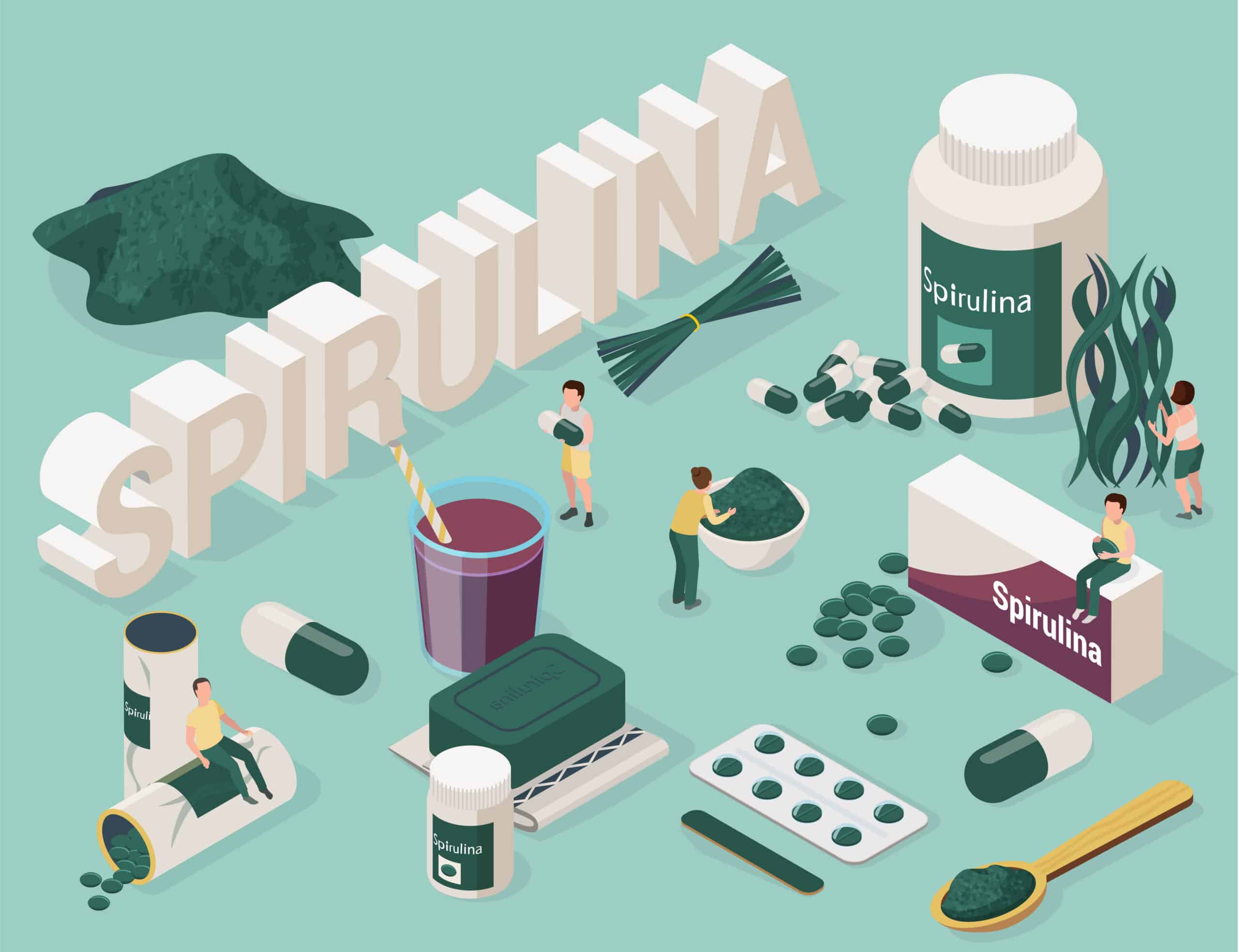Key Takeaways
-
Add spirulina to your daily routine through smoothies and juices or sprinkling it over salads to reap its numerous health benefits.
-
Monitor blood pressure and blood sugar: If you have high or diabetes, consider supplementing spirulina in your diet after consulting with a healthcare professional to regulate these conditions potentially.
-
Enhance muscle strength and endurance: Athletes and fitness enthusiasts can explore the benefits of spirulina, a food for improving muscle strength and endurance, potentially aiding in performance during workouts and physical activities.
-
Manage cholesterol, weight, and obesity: Spirulina may contribute to managing cholesterol levels and supporting weight management efforts, making it a valuable addition to a healthy lifestyle.
-
Be mindful of potential risks: While spirulina offers various benefits, be aware of potential risks and side effects, especially if you have specific health conditions or are pregnant or breastfeeding. Consult a healthcare professional before incorporating it into your routine.
-
Explore diverse consumption methods: Experiment with different ways to consume spirulina, such as adding it to smoothies, energy bars, or even savory dishes, to help people enjoy its multifaceted benefits.
What is Spirulina?
Nutritional Value
Spirulina is a type of blue-green algae consumed for centuries by people due to its high nutritional value. It is known for its rich protein content, making it a popular dietary supplement.
Spirulina is a super healthy plant with many good things like vitamins and minerals. It’s great for people who don’t eat meat and want more nutrients. Some studies say it can help remove heavy metals from your body, and it also seems to be good for allergies and makes you stronger during exercise.
Origins and Nutritional Profile of Spirulina
Source
Spirulina has its origins in freshwater lakes in Africa and Central America. These natural habitats provide the ideal conditions for spirulina to thrive, allowing it to absorb nutrients from its environment.
Spirulina is a powerhouse of essential nutrients. It contains an impressive array of vitamins, minerals, and antioxidants vital for overall health. For example, it’s rich in vitamin B1 (thiamine), which supports energy production in the body.
The protein content in spirulina is also noteworthy. A single tablespoon of this blue-green algae can deliver a significant amount of protein, making it an excellent choice for vegetarians or anyone looking to increase their protein intake without consuming meat.
In addition to protein, spirulina is packed with other valuable nutrients such as iron, providing important support for healthy red blood cells; potassium, crucial for maintaining healthy blood pressure; and antioxidants like phycocyanin, which helps fight oxidative stress within the body.
Health Benefits of Spirulina Consumption
Immune Support
Consuming spirulina can provide a significant boost to your overall health. This blue-green algae is known for its potential anti-inflammatory and antioxidant effects, which can help support the immune system. Incorporating spirulina into your diet may enhance your body’s ability to fight off infections and maintain optimal health.
Spirulina contains essential nutrients like vitamins, minerals, and antioxidants that promote well-being. Its high concentration of nutrients contributes to its potential as an immune booster, making it a valuable addition to a healthy diet.
Detoxification Potential

One of the remarkable benefits of spirulina consumption is its potential to promote detoxification within the body. Chlorophyll in spirulina supports natural cleansing by removing toxins and heavy metals from the bloodstream.
Incorporating spirulina into your diet may assist in purifying your system and supporting liver function, ultimately contributing to improved overall health. Its detoxification properties make it an appealing option for individuals looking to enhance their well-being through natural means.
Spirulina for Blood Pressure and Blood Sugar Regulation
Supporting Healthy Blood Pressure
Research suggests that spirulina, et al, may play a role in regulating blood pressure levels. The high concentration of nutrients, including vitamin B12, in spirulina could contribute to cardiovascular health. For instance, a study found that spirulina supplements (et al) significantly reduced systolic and diastolic blood pressure.
Spirulina’s potential impact on blood pressure is promising for individuals looking to manage their cardiovascular health naturally. By incorporating spirulina into their diets, they may experience the benefits of maintaining healthy blood pressure levels.
Promoting Balanced Blood Sugar Levels
Furthermore, spirulina has shown promise in supporting healthy blood sugar levels. This blue-green algae contains compounds linked to improved insulin sensitivity and glucose metabolism. In one study, participants with metabolic syndrome who took spirulina experienced notable improvements in fasting blood sugar levels compared to those who received a placebo.
For individuals concerned about their blood sugar management or at risk of developing type 2 diabetes, adding spirulina to their daily routine could potentially aid in regulating their blood sugar levels effectively.
Spirulina’s Role in Muscle Strength and Endurance
Protein Content
Spirulina, a type of blue-green algae, is often used by athletes to improve endurance and muscle strength. The high protein content in spirulina plays a crucial role in supporting muscle repair and growth. This protein provides the necessary building blocks for the body to recover from intense physical activity, helping athletes maintain their performance levels.
Spirulina contains all nine essential amino acids, making it an excellent source of complete protein. These amino acids are vital for strengthening muscle tissue after strenuous exercise. As a result, incorporating spirulina into an athlete’s diet can aid in sustaining or increasing muscle strength over time.
Iron Optimization
In addition to its protein content, spirulina also boasts significant amounts of iron. This mineral is essential for optimizing oxygen transport throughout the body during physical activity. By enhancing oxygen circulation, iron helps combat fatigue during workouts and supports overall endurance.
-
High protein content supports muscle repair
-
Contains all nine essential amino acids for muscle tissue recovery
-
Significant iron levels optimize oxygen transport during physical activity
Spirulina’s Impact on Cholesterol and Weight Management
Lowering Cholesterol
Research shows that spirulina can help lower “bad” LDL cholesterol in your body. This is because it contains a pigment called phycocyanin, which has antioxidants and anti-inflammatory properties. These properties can reduce stress and inflammation, leading to high cholesterol. Adding spirulina to your diet can help lower your LDL cholesterol and reduce the risk of heart disease.
Weight Management

The high protein content in spirulina makes it an excellent addition to weight management efforts. Protein has been shown to enhance feelings of fullness and satiety, which can aid in controlling appetite and calorie intake. The nutrient density of spirulina means that it provides essential nutrients while being low in calories.
Incorporating spirulina into a balanced diet for weight control can be beneficial because it provides essential nutrients without contributing excess calories or unhealthy fats. This makes it easier for individuals aiming for weight management or obesity prevention as they work towards achieving their fitness goals by maintaining a healthy body weight.
Risks and Side Effects of Spirulina Intake
Digestive Discomfort
Some individuals may experience digestive discomfort when consuming spirulina. This can manifest as bloating, nausea, or stomach cramps. It’s important to start with a small amount of spirulina to gauge your body’s reaction before increasing the dosage.
Spirulina is a high-fiber substance, which can sometimes lead to digestive issues in people not used to consuming a lot of fiber. If you notice any discomfort after taking spirulina, it’s best to reduce the amount or stop using it altogether.
Contaminated Products
Contaminated spirulina products may pose health risks, so choosing a reputable source is crucial. Some lower-quality spirulina supplements might contain harmful substances such as heavy metals like arsenic or mercury. These contaminants can have serious health implications if consumed regularly over time.
To avoid this risk, always purchase spirulina from trusted brands that provide third-party testing for purity and quality. Look for certifications from reputable organizations that ensure the product meets safety standards.
Autoimmune Conditions
People with certain autoimmune conditions should consult a healthcare professional before using spirulina. While generally safe for consumption, some individuals with autoimmune disorders could experience adverse effects due to the algae’s immune-stimulating properties.
For instance, those with lupus or rheumatoid arthritis should seek medical advice before incorporating spirulina into their diet or supplement regimen.
Practical Ways to Incorporate Spirulina into Your Diet
Morning Smoothie or Juice
Adding a teaspoon of spirulina powder to your morning smoothie or juice can be an effortless way to supplement your diet with this nutrient-rich food. The vibrant green color of spirulina might give your drink an appealing look, and its mild taste blends well with fruits and vegetables. This method allows you to enjoy spirulina’s benefits without significantly adjusting your regular eating habits.
Spirulina is a versatile ingredient that can be mixed into salad dressings or dips, providing an additional nutritional boost without altering the flavor drastically. By incorporating spirulina in these ways, you can easily enhance the nutritional value of your meals while enjoying familiar flavors. For example, combining spirulina with olive oil, lemon juice, and herbs creates a nutritious salad dressing.
Homemade Energy Bars or Protein Balls
Incorporating spirulina into homemade energy bars or protein balls offers a convenient snack for essential nutrients. These treats are ideal for those who lead busy lifestyles and need quick nourishment on the go. By blending dates, nuts, seeds, and a dash of spirulina, you can create wholesome snacks that contribute to overall wellness.
The Multifaceted Benefits of Spirulina
Nutrient-Rich Superfood
Spirulina is a superfood that’s full of vitamins and nutrients. It has protein, iron, and vitamin B1 for energy. It also has antioxidants to protect your body. Adding spirulina to your diet can help with heart health, exercise performance, and overall wellness. Studies show it can lower blood pressure and improve immune system activity.
Mindful Utilization for Overall Wellness
Spirulina can be a safe and valuable addition to a balanced diet when used mindfully. It can be consumed in various forms, such as powder or tablets, and easily incorporated into smoothies, juices, or baked goods. However, it’s important to be mindful of the total amount consumed, as excessive intake may lead to adverse effects.
Incorporating spirulina into your diet can provide numerous benefits. It’s essential to ensure that you are obtaining this superfood from reputable sources to guarantee its safety and quality. By incorporating spirulina into your diet in moderation, you can harness its potential to support your overall wellness.
Frequently Asked Questions
What is spirulina?
Spirulina is a type of blue-green algae rich in nutrients and antioxidants. It’s often consumed as a dietary supplement due to its high protein and vitamin content.
Where does spirulina come from?
Spirulina has been harvested for centuries in various parts of the world, including Mexico, Africa, and Hawaii. Today, it’s cultivated globally in freshwater ponds and lakes.
What are the health benefits of consuming spirulina?
Consuming spirulina can contribute to lower blood pressure, improved muscle strength and endurance, better cholesterol levels, and potential weight management benefits.
Are there any risks or side effects associated with taking spirulina?
While generally considered safe for most people, some individuals may experience allergic reactions or digestive issues when taking spirulina supplements. It’s important to consult with a healthcare professional before starting any new supplement regimen.
How can I incorporate spirulina into my diet?
You can easily add spirulina powder to smoothies and juices or even sprinkle it over salads or yogurt. Recipes are also available for making energy balls or bars using spirulina as an ingredient.

